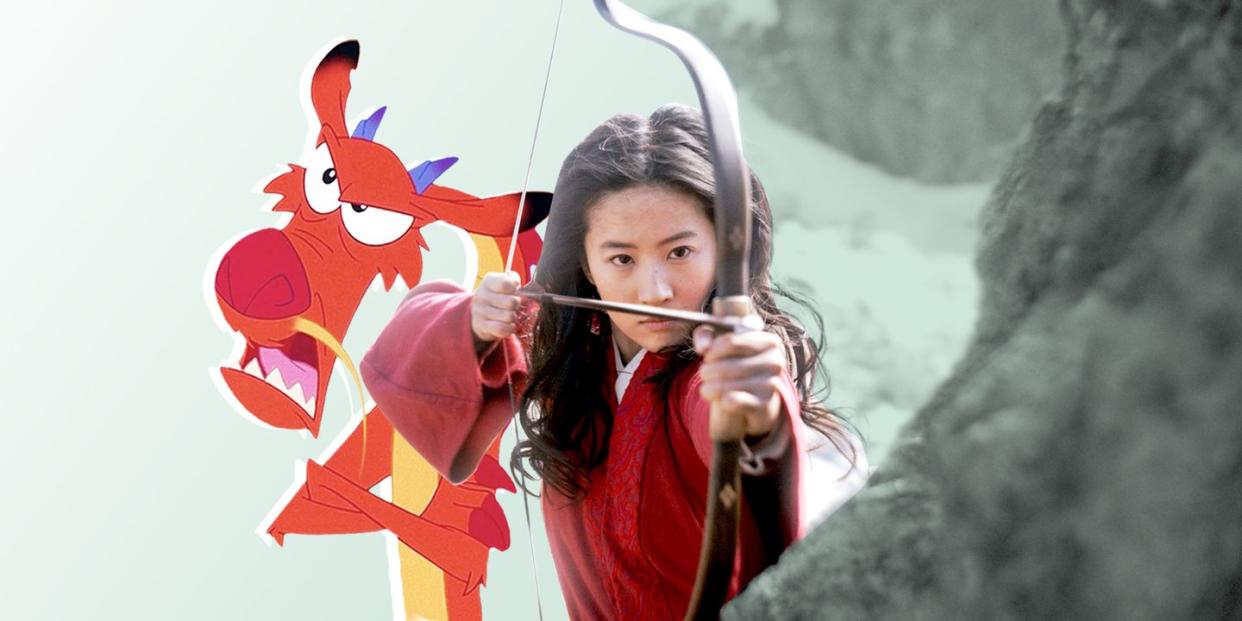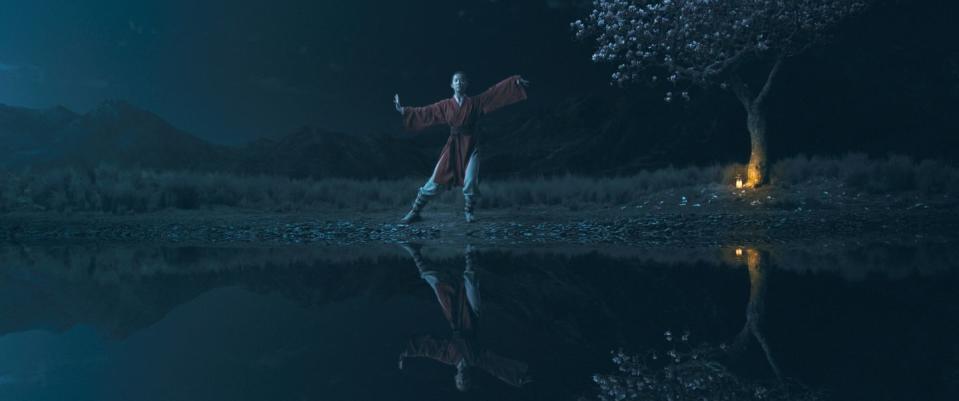'Mulan' Never Really Needed Mushu Anyway

- Oops!Something went wrong.Please try again later.
When someone in my life does something mildly shameful, whether it’s spilling a drink at a restaurant or tripping on broken pavement, I always make the same remark: “Dishonor! Dishonor on your whole family! Dishonor on you! Dishonor on your cow!”
If you didn’t already know, these are the immortal words of Mushu, the pint-sized, trash-talking red dragon from Disney’s Mulan. Voiced unforgettably by Eddie Murphy, Mushu is among Disney’s most beloved animated sidekicks, lodged somewhere lofty in the sidekick pantheon alongside Timon and Pumbaa. Overconfident and gregarious, he plays a pivotal role in Mulan’s ascension from zero to hero, aiding her in her quest to conceal her identity from the imperial army and later save China’s Imperial City from bloodthirsty Hun invaders. Fans of the animated classic were outraged when word spread that Mushu would be excised from the big budget, live-action remake of Mulan, which aims for a more realistic rendering of China’s beloved folk hero. In that version of the story, producers argued, wise-cracking Mushu had no place; their instincts clearly paid off, now that Mulan is nominated for two Academy Awards (Best Visual Effects and Best Costume Design). I’m here to tell you that, as much as I love to quote the little firecracker, I didn’t miss him one bit during the live-action adaptation.
Fabricated for the 1998 movie, Mushu is part and parcel of everything that Chinese audiences disliked about the Disneyfication of their ancestral folk tale. According to Stanley Rosen, the director of East Asian Studies at the University of Southern California, many Chinese moviegoers felt that Mushu “trivialized” their culture—so much so that the movie bombed in China, raking in just $30,000 (approximately $47,000 in today’s dollars) in the province of Hunan, Mulan’s supposed birthplace. Lisa Niu, a Chinese moviegoer interviewed by The Baltimore Sun at the time of the film’s release, took issue with Mushu’s guileless, self-serving attitude, commenting, “This is not a Chinese dragon. I can tell the people who designed the dragon are from America.”
Jason Reed, a producer of the live-action remake, spoke about Disney’s efforts to right their previous wrongs, commenting, “Obviously, Mushu is a beloved character, and one of the most memorable of the animated film. It turns out that the traditional Chinese audience did not particularly think that was the best interpretation of the dragon in their culture. That the dragon is a sign of respect, and of strength and power, and sort of using it as a silly sidekick did not play well with a traditional Chinese audience.”

Let’s face it: Mushu has no place in a film that seeks to honor and accurately portray Chinese culture. Losing the little guy makes for a more dramatic, grounded film--one where Mulan can take charge of her own story, and where choices about the role of the unreal are grounded not in a quest for maximum laughs, but in bona fide Chinese roots. Certainly this new Mulan retains elements of the fantastical, from a shape-shifting sorceress to gravity-defying Rouran invaders scaling city walls, but that’s not Disney magic--it’s Chinese magic, drawn from ancient folklore about female shamans and stylistic conventions from Chinese martial arts films. Rather than drawing the fantastical from an Americanized stereotype of a Chinese dragon, this Mulan finds magic within authentically Chinese source material.
To axe Mushu is also to create a bolder, more powerful characterization of Mulan. Though Mushu occasionally proved a thorn in Mulan’s side, he ultimately bailed her out a number of times, acting as her biggest cheerleader and even saving her life at the conclusion of the film. Without Mushu, Mulan must conceal her own secret, use her own wiles, and fight her own battles, meaning that she gains newfound agency and independence. In the decades since the original film, the character of Mulan has resonated with young girls around the world as a symbol of courage, strength, and unstoppable spirit, serving as a galvanizing figure for impressionable young viewers seeking validation that girls are just as powerful as boys. Yet without Mushu, fully empowered to chart her own path, Mulan is poised to loom even larger as a proto-feminist hero.
Somewhere in animation Valhalla, I like to think that Mushu is looking down on this live-action Mulan, misty-eyed with pride and just a few tears. He sees her charging into battle, saving her comrades from an avalanche, rescuing the Imperial City from certain doom, all without his ham-fisted help. Just like back in 1998, he’s turning to his pal Cri-Kee and saying, his voice thick with emotion, “My little baby’s all grown up and saving China. You have a tissue?”
You Might Also Like

